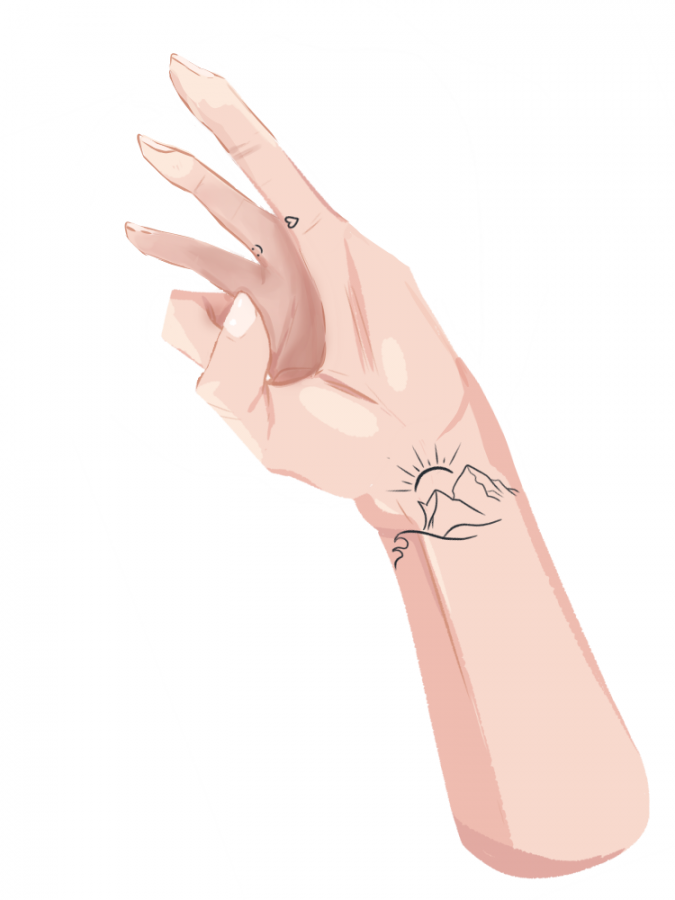Teen tattoo taboos: Reasoning, perception of body art on students
April 6, 2020
“Did you draw that?”
“That’s not permanent, right?”
“That can’t be real.”
At first glance, they appear as sharpie doodles on arms or legs. Madi Hood ’20 said her tattoos are commonly mistaken for temporary, insignificant drawings done out of boredom during sixth hour math or science class. But to Hood and other people that have them, they are permanent pieces of art etched onto their bodies, done with a purpose.
Hood got her first tattoo at age 16, right before the end of her sophomore year. She said her first stick-and-poke tattoo was a smiley face on her ring finger, and it was done simply for fun. She later gave herself a second tattoo, a small heart located on her middle finger.
“They both remind me of my friends and how much I love the happy memories I have with them,” Hood said.
Similarly to Hood, Cassidy Kline ’21 got a tattoo when she was 16. Kline said her tattoo (a mix of the waves, mountains and the sun) was professionally done and is important to her because seeing it every day “is a glance of happiness and joy.”
“It’s (composed) of places where I have fun memories,” Kline said. “It symbolizes milestones from my past, and it is a reminder that life always gets better through hard times.”
Kline said her mother initially did not support her desire to get a tattoo because she herself has body art that she no longer likes, but eventually gave in to her request. Kline said her father went with her to get the tattoo from a parlor in St. Clair Shores.
“Surprisingly, my parents were pretty approving of my tattoo,” Kline said. “My mom took a little more convincing than my dad, but they both really like it and think it is pretty.”
Hood had an inverse experience, as her mother does not approve of her stick-and-pokes, and did not know about them before Hood had them done. According to Hood, while the tattoos do last a while, they sometimes fade away within five or 10 years.
“My mom has never approved of anything permanent or semi permanent that I do to my body- like tattoos or piercings- so she definitely does not like them,” Hood said.
A South parent said he does not like that some parents approve of their teenagers getting permanent body art because kids that age “live in the moment and often do not see the long-term- sometimes harmful- effects of things they do.”
“Sometimes parents are more focused on being their kid’s friend instead of parent,” South parent said. “I think you have to try to be both and help your kids see how a decision you make when you’re young will remain with you your whole life.”
Hood disagrees with the South parent and believes parents should be more supportive and accepting of their kids’ tattoos because most of them put a lot of thought into their decisions to get them.
“Even if the tattoos seem pointless, it is the teenagers body, and their decisions with it should be more supported than anything else,” Hood said. “I’m not saying to encourage your children to get tattoos, but if they want to or have, just remember it’s their choice what they do with their bodies and being strict or mean can only lead them to make more rash decisions.”
According to Hood, the stereotype of teenagers getting tattoos and then regretting them is not true. Both her and Kline agree that their tattoos are meaningful and will not be seen as mistakes when they get older.
“I definitely will not regret mine because I love them and they are very special to me,” Hood said. “At the end of the day the teens who are getting tattoos are confident and independent people who feel secure enough in their own decisions to make them permanent.”
The South parent said teens should at least wait until they are older so they can truly understand the consequences of their choices. According to the South parent, people evolve in many ways as they grow up, so anything done as a teenager may be seen differently later in life.
“As our passions and interests change, what seemed really important at 17 might seem trivial as an adult,” South parent said. “Why burden your older self with something like a tattoo?”
Hood said teenagers should be able to make their own decisions, and live with any possible consequences that arise. She believes they simply want to express their individuality.
“Everyone in the high school age group is trying to do something for themselves, maybe even something kind of risky or stupid because that’s just what kids do,” Hood said. “We all want to have fun and make memories, sometimes just more permanent ones.”
















































































